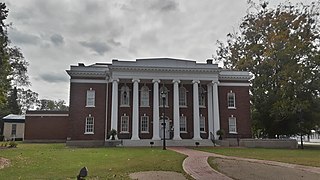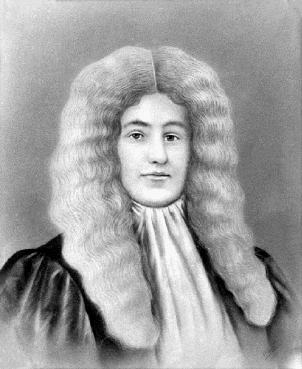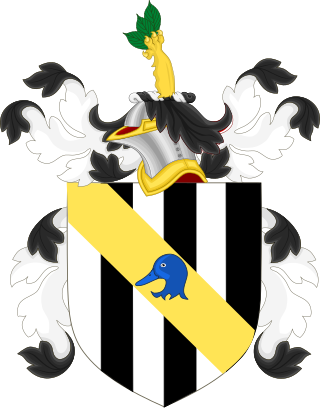See also
- Nathaniel Bacon School, a historic school building in Richmond, Virginia
Nathaniel Bacon may refer to:

1676 (MDCLXXVI) was a leap year starting on Wednesday of the Gregorian calendar and a leap year starting on Saturday of the Julian calendar, the 1676th year of the Common Era (CE) and Anno Domini (AD) designations, the 676th year of the 2nd millennium, the 76th year of the 17th century, and the 7th year of the 1670s decade. As of the start of 1676, the Gregorian calendar was 10 days ahead of the Julian calendar, which remained in localized use until 1923.

Nathaniel Bacon was an English merchant adventurer who emigrated to the Virginia Colony, where he sat on the Governor's Council but later led Bacon's Rebellion. The Rebellion was briefly successful; but after Bacon’s death from dysentery the rebel forces collapsed.

Bacon's Rebellion was an armed rebellion by Virginia settlers that took place from 1676 to 1677. It was led by Nathaniel Bacon against Colonial Governor William Berkeley, after Berkeley refused Bacon's request to drive Native American Indians out of Virginia. Thousands of Virginians from all classes and races rose up in arms against Berkeley, chasing him from Jamestown and ultimately torching the settlement. The rebellion was first suppressed by a few armed merchant ships from London whose captains sided with Berkeley and the loyalists.

The Boston Brahmins, or Boston elite, are members of Boston's historic upper class. From the late 19th century through the mid-20th century, they were often associated with a cultivated New England accent, Harvard University, Anglicanism, and traditional British-American customs and clothing. Descendants of the earliest English colonists are typically considered to be the most representative of the Boston Brahmins. They are considered White Anglo-Saxon Protestants (WASPs).

Surry County is a county in the southeastern part of the Commonwealth of Virginia. As of the 2020 census, the population was 6,561.
The Declaration of the People of Virginia, or simply the Declaration of the People, was a list of complaints issued by Nathaniel Bacon on July 30, 1676, in which he proclaimed Virginia's colonial governor, William Berkeley, to be corrupt and expressed his displeasure at what his followers regarded as unjust taxation and the government's failure to provide colonists protection from some tribes of American Indians. The presumed grievances brought about the uprising known as Bacon's Rebellion. This Rebellion was regarded as the first of the new colonies. Whether Bacon's Rebellion was serving the interest of the colonists, or the King, continues to be debated. The Declaration and the Rebellion as a whole was a long time coming and was the result of a crisis within Virginia's social, economic, and political problems.

Varina is a former unincorporated community and current magisterial district in the easternmost portion of Henrico County, Virginia, United States.

Bacon's Castle, also variously known as "Allen's Brick House" or the "Arthur Allen House" is located in Surry County, Virginia, United States, and is the oldest documented brick dwelling in what is now the United States. Built in 1665, it is noted as an extremely rare example of Jacobean architecture in the New World.

John Washington was an English-born merchant, planter, politician and military officer. Born in Tring, Hertfordshire, he subsequently emigrated to the English colony of Virginia and became a member of the planter class. In addition to serving in the Virginia militia and owning several slave plantations, Washington also served for many years in the House of Burgesses, representing Westmoreland County. He was the first member of the Washington family to live in North America and was a paternal great-grandfather of George Washington, the first president of the United States.

Occoneechee State Park is a state park near Clarksville, Virginia, located along Buggs Island Lake. Occoneechee State Park is 2,698 acres in size. Its name reflects the Occaneechi Indians, who lived on an island in the Roanoke River near its confluence with the Dan River, which was flooded by the creation of the Kerr Lake reservoir in 1952.
Colonel Thomas Ballard was a prominent colonial Virginia landowner and politician who played a role in Bacon's Rebellion. He served on the Governor's Council 1670–79 and was Speaker of the Virginia House of Burgesses 1680–82.

Colonel Augustine Warner Jr. was an American planter, military officer and politician. He served in the House of Burgesses from 1666 to 1677 and was its Speaker in two separate sessions in 1676 and 1677, before and after Bacon's Rebellion. Warner then served on the Virginia Governor's Council from October 1677 until his death. Warner is the last common ancestor of George Washington and King Charles III.

Jamestown, also Jamestowne, was the first settlement of the Virginia Colony, founded in 1607, and served as the capital of Virginia until 1699, when the seat of government was moved to Williamsburg. This article covers the history of the fort and town at Jamestown proper, as well as colony-wide trends resulting from and affecting the town during the time period in which it was the colonial capital of Virginia.

The Burwells were among the First Families of Virginia in the Colony of Virginia. John Quincy Adams once described the Burwells as typical Virginia aristocrats of their period: forthright, bland, somewhat imperious and politically simplistic by Adams' standards. In 1713, so many Burwells had intermarried with the Virginia political elite that Governor Spotswood complained that " the greater part of the present Council are related to the Family of Burwells...there will be no less than seven so near related that they will go off the Bench whenever a Cause of the Burwells come to be tried."
Sarah Prescott Drummond was a prominent member of Bacon's Rebellion, one of the first landowning women in America, and the wife of William Drummond, the first colonial governor of Albemartle Sound settlement, Provence of Carolina.
Nathaniel is an English variant of the biblical Hebrew name Nathanael. It can be a given or surname.
Edward Hill Jr. was a controversial Virginia planter, local official and politician, who like his father operated Shirley Plantation in part using enslaved labor, as well as briefly served as 20th Speaker of the Virginia House of Burgesses, and several times represented Charles City County in that body.
Nathaniel Bacon, sometimes referred to as "Bacon the Elder" was a politician in colonial Virginia. As President of the Virginia Governor's Council, Bacon served as the acting Governor of Virginia during multiple periods in the 1680s and 1690s.
Thomas Pate was a British merchant who became a planter, military officer, ferry owner and politician who served a term as burgess representing Gloucester County in the House of Burgesses. Rebel Nathaniel Bacon commandeered this man's house in Gloucester County during Bacon's Rebellion, and later Governor Howard also lived there. Across Mobjack Bay, the restored historic Yorktown home once named after this man is now renamed the "Cole Digges" house after a politically powerful successor owner and resident since recent archeological research indicates it was probably built decades after this man's death.
Otto Thorpe or Thorp(1630-winter of 1696/1697) was an English merchant who became a militia officer and politician of Middle Plantation in the Colony of Virginia. His home was commandeered during Bacon's Rebellion, and in April 1682, Thorpe briefly represented York County in the House of Burgesses, before returning to England, where he died more than a decade later.